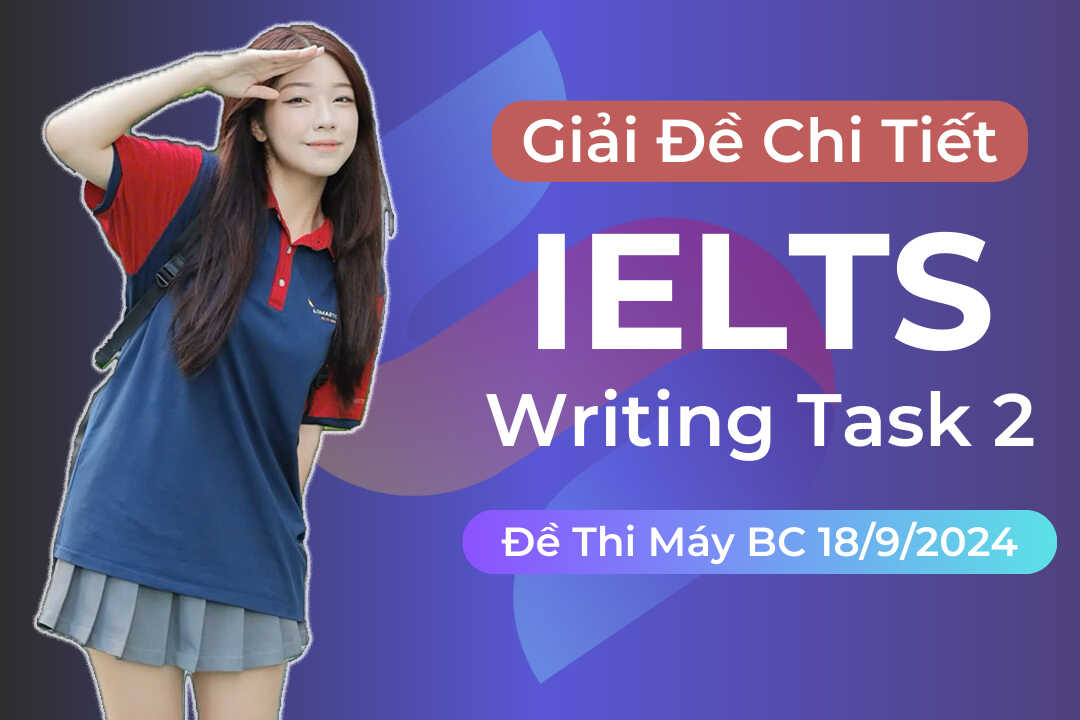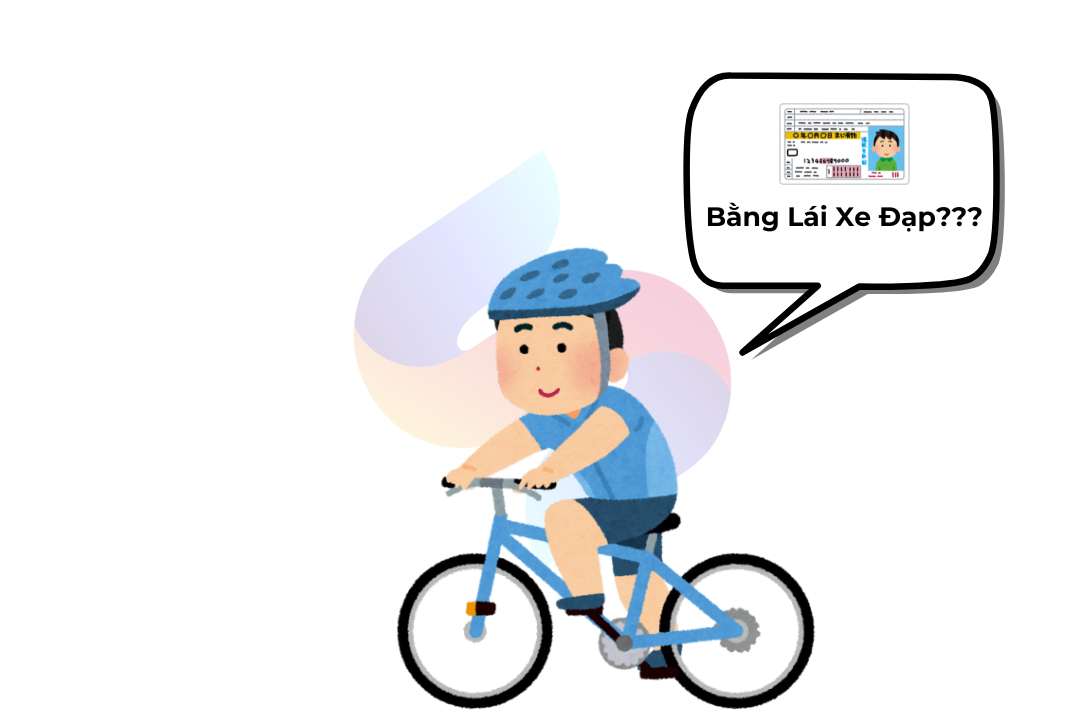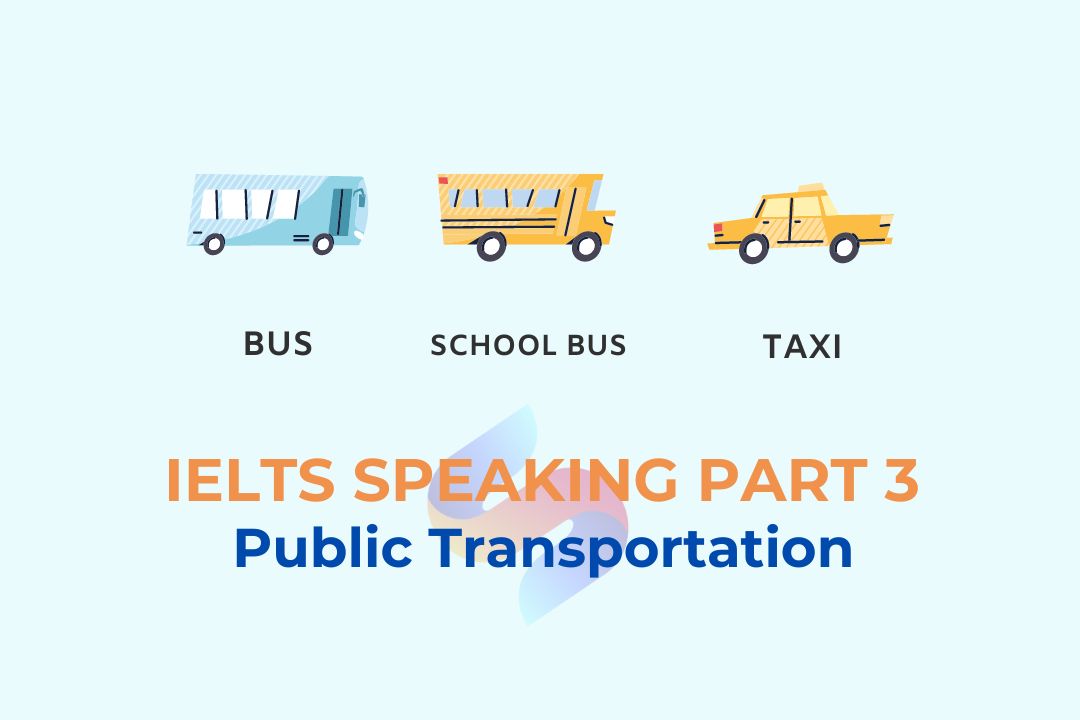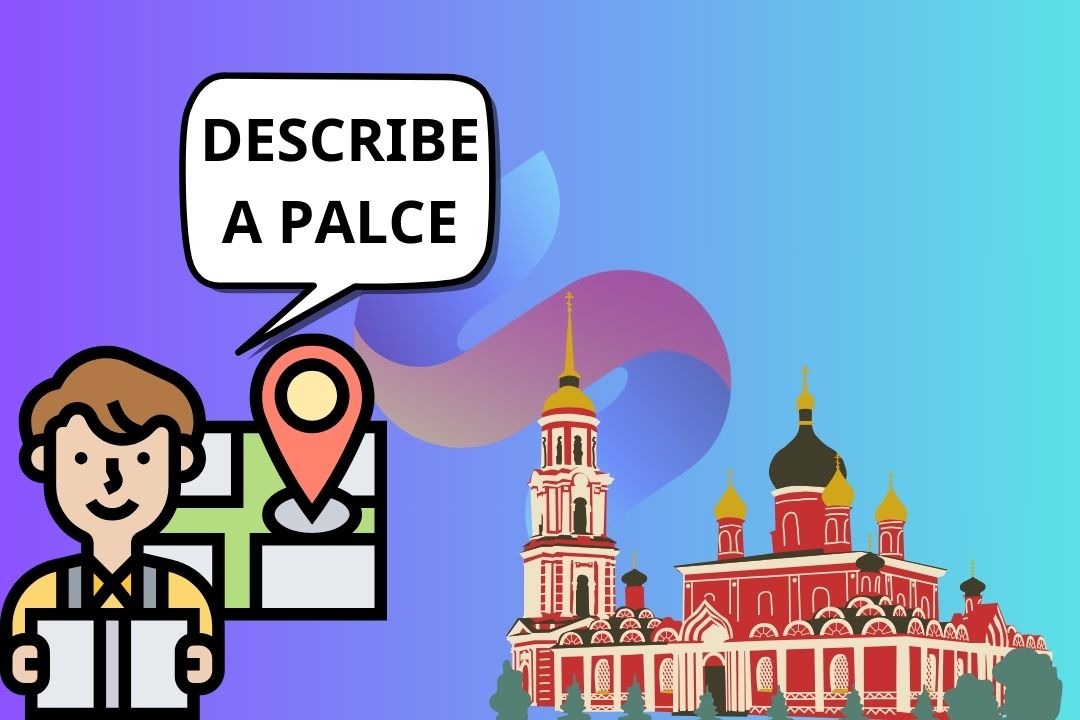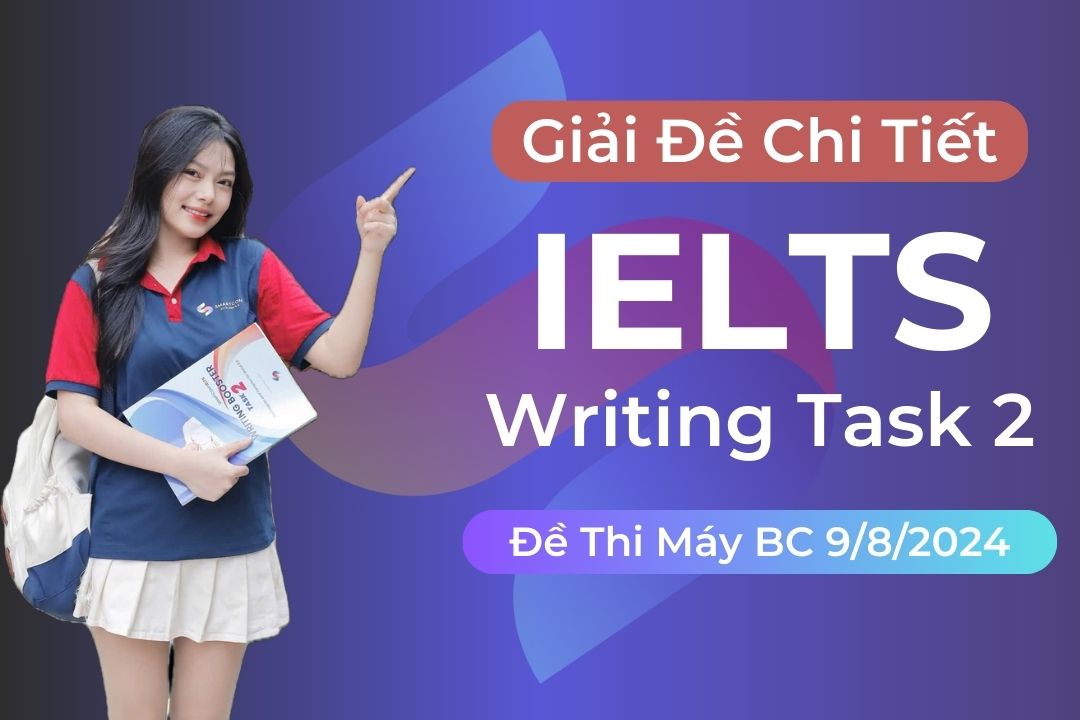Trong bài thi IELTS Speaking Part 2, chủ đề “Describe a person” yêu cầu thí sinh miêu tả một người mà họ có mối quan hệ hoặc cảm xúc đặc biệt. Đây là cơ hội để thí sinh thể hiện khả năng sử dụng từ vựng phong phú và nói liên tục về ngoại hình, tính cách, và những ảnh hưởng mà người đó mang lại. Cùng Smartcom English khám phá cách xử lý khi gặp chủ đề Describe a person qua bài viết dưới đây.
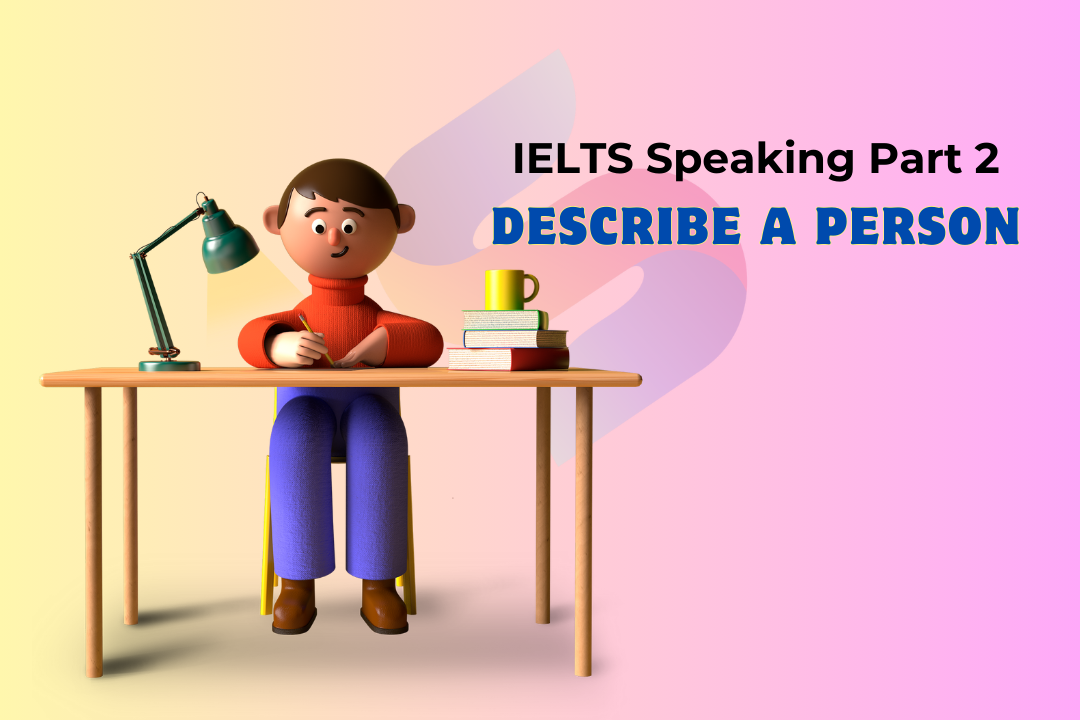
Bộ câu hỏi mẫu về chủ đề “Describe a person”
Thường đề bài sẽ yêu cầu bạn mô tả một người cụ thể và có thể hỏi bạn thêm một số câu phụ như: Bạn biết người này như thế nào? Tại sao bạn ngưỡng mộ hoặc nhớ về họ? Dưới đây là bộ câu hỏi mẫu thường gặp trong các đề thi IELTS Speaking part 2 qua các năm:
- Describe someone you admire.
- Describe a person who has influenced you.
- Describe a family member you spend a lot of time with.
- Describe a friend who is a good listener.
Đối với dạng chủ đề này bạn nên sử dụng từ vựng đa dạng miêu tả ngoại hình và tính cách với các từ phù hợp (e.g., “compassionate”, “charismatic”). Kết hợp thì quá khứ miêu tả quá khứ của mối quan hệ và thì hiện tại của người đó. Đồng thời sử dụng cả các ví dụ cá nhân để làm phần nói của bạn sinh động hơn. Cụ thể thế nào hãy cùng khám phá cấu trúc bài nói mẫu về chủ đề này!
Cấu trúc bài nói về chủ đề “Describe a person”
Đầu tiên: Nêu thông tin chung về người đó
Bạn nên bắt đầu bằng việc giới thiệu người mà bạn chọn để miêu tả (họ là ai, bạn biết họ như thế nào, và tại sao lại chọn người đó). Nếu có thể, cung cấp thông tin ngắn gọn về nghề nghiệp, vai trò của họ trong cuộc sống của bạn.
Mẫu câu gợi ý:
“I would like to describe my mother, who has had a profound impact on my life.”
“The person I admire the most is my best friend, who is incredibly supportive.”
Ví dụ: “The person I admire the most is my grandfather. He has been a significant influence on me since I was a child, and he’s now retired after working as a teacher for over 30 years.“
Tiếp theo: Miêu tả chi tiết về người đó
Ngoại hình: Miêu tả sơ qua về ngoại hình nếu phù hợp, nhưng không cần quá chi tiết. Tập trung hơn vào tính cách và hành động.
Tính cách và hành động: Đây là phần quan trọng nhất khi miêu tả người. Thay vì chỉ dùng những từ chung chung như “kind” hay “nice,” hãy đưa ra những ví dụ hoặc câu chuyện minh họa cho những đặc điểm tính cách này.
Mẫu câu gợi ý:
“She is incredibly patient, and I remember a time when she spent hours helping me with a difficult project.”
“He is a diligent person who never gives up, no matter how challenging the task may be.”
Cuối cùng: Kết nối với bản thân hoặc cuộc sống
Miêu tả cách mà người đó ảnh hưởng đến bạn hoặc đã thay đổi cuộc sống của bạn. Điều này sẽ giúp câu trả lời thêm phần cá nhân và sâu sắc hơn.
Mẫu câu gợi ý:
“Thanks to her, I’ve become more confident in my own abilities.”
“His perseverance has inspired me to work harder and not be discouraged by failures.”
Khi miêu tả một người, có một số điểm cần lưu ý khác biệt để giúp câu trả lời trở nên chi tiết và cá nhân hơn trong IELTS Speaking Part 2. Dưới đây là một số lưu ý quan trọng:
1. Tập trung vào tính cách và hành động (Character & Actions):
Miêu tả con người yêu cầu sự nhấn mạnh về tính cách và hành động. Điều này giúp thể hiện sự kết nối cảm xúc giữa bạn và người bạn đang miêu tả.
- Ví dụ: Khi tả người, bạn cần đề cập đến hành động cụ thể của họ, như “He always puts others before himself.”
2. Cung cấp ví dụ cụ thể:
Thay vì chỉ nói về đặc điểm chung chung, hãy đưa ra những ví dụ minh họa rõ ràng về các hành động hoặc sự kiện mà bạn đã chứng kiến người đó làm, để làm sáng tỏ phẩm chất của họ.
- Ví dụ: Thay vì nói “She is kind,” hãy nói “She is kind, and I remember one time she stayed up all night to help me finish my school project.”
3. Phân tích tác động cá nhân (Personal Impact):
Miêu tả người cần phải nêu rõ tác động mà họ có lên cuộc sống của bạn, làm thế nào mà họ ảnh hưởng đến bạn.
- Ví dụ: “Thanks to her, I’ve become a more confident person” là một câu có tác động hơn nhiều so với việc chỉ miêu tả đơn thuần ngoại hình.
4. Từ vựng cần cụ thể và chính xác hơn:
- Đối với miêu tả người, các từ liên quan đến tính cách và hành vi là cần thiết. Thay vì các từ chung chung như “nice” hoặc “helpful,” hãy dùng từ cụ thể hơn như empathetic (thấu cảm), altruistic (vị tha), charismatic (có sức hút).
- Ví dụ: “She has a warm and charismatic personality that makes people feel at ease around her.”
Từ vựng & cụm từ ăn điểm
Từ vựng:
- Charismatic /ˌkærɪzˈmætɪk/: cuốn hút, có sức lôi cuốn
- Diligent /ˈdɪlɪdʒənt/: chăm chỉ
- Compassionate /kəmˈpæʃənət/: giàu lòng trắc ẩn
- Influential /ˌɪnfluˈɛnʃəl/: có tầm ảnh hưởng
Cụm từ:
- Have a lasting impact on: có ảnh hưởng lâu dài
- Role model: hình mẫu lý tưởng
- Admire someone for: ngưỡng mộ ai đó vì…
- Bring out the best in someone: giúp ai đó phát huy tiềm năng tốt nhất
Vấn đề thí sinh thường gặp với chủ đề này
1. Thiếu chi tiết cụ thể:
Lỗi thường gặp: Chỉ miêu tả tính cách một cách chung chung mà không cung cấp ví dụ cụ thể để làm rõ phẩm chất của người được miêu tả.
Lưu ý: Hãy kể một câu chuyện hoặc sự kiện cụ thể để minh họa cho tính cách của người đó, như cách họ giúp đỡ bạn hoặc vượt qua khó khăn.
2. Dùng từ vựng quá đơn giản:
Lỗi thường gặp: Sử dụng những từ như “kind” hoặc “nice” mà không có từ vựng phong phú hơn.
Lưu ý: Thay thế bằng những từ có sắc thái mạnh hơn như “empathetic” (thấu cảm) hoặc “charismatic” (có sức hút).
3. Không đề cập đến ảnh hưởng cá nhân:
Lỗi thường gặp: Chỉ miêu tả người đó mà không nói rõ họ ảnh hưởng đến bạn như thế nào.
Lưu ý: Đừng quên liên hệ người đó với cuộc sống của bạn và nhấn mạnh tác động mà họ mang lại.
Bài nói mẫu chủ đề “Describe a person”
Describe a family member who has an important influence on you
You should say:
– Who the person is
– How long you have known him/her
– What qualities this person has
And explain why this person has had such an influence on you.
Mẫu câu trả lời:
Thanks for your question. I would like to describe my mother, who has been the most influential person in my life. She is a compassionate woman with a warm personality and an unwavering dedication to her family. My mother is not just a typical homemaker but a role model for me in every sense.
She is of average height with short, curly hair, and what I find most striking about her is her kind eyes that always seem to reflect empathy. More than just her appearance, her character is what I admire most. She is incredibly diligent, waking up early every day to ensure that everything runs smoothly at home, all while managing her own small business.
I have learned countless life lessons from her, but what stands out is her persistence in the face of adversity. There was a time when her business was struggling, but instead of giving up, she worked even harder and turned things around. Thanks to her, I’ve learned how to be resilient and to always believe in myself, no matter how tough the situation is.
Phân tích:
- Mở đầu: Người nói giới thiệu về người mẹ với thông tin cơ bản (bạn chọn ai, lý do).
- Phần giữa: Miêu tả chi tiết về tính cách, ngoại hình, và một ví dụ cụ thể (câu chuyện về thời gian khó khăn của mẹ).
- Kết thúc: Nói về ảnh hưởng tích cực mà người mẹ đã mang lại cho người nói.
Từ vựng ghi điểm:
- Compassionate /kəmˈpæʃənɪt/ (adj) – giàu lòng trắc ẩn
- Diligent /ˈdɪlɪdʒənt/ (adj) – chăm chỉ
- Unwavering dedication /ʌnˈweɪvərɪŋ -ˌdɛdɪˈkeɪʃən/ (n.p) – sự cống hiến không ngừng
- Persistence in the face of adversity /pəˈsɪstəns – ɪn – ðə – feɪs – əv – ədˈvɜːrsɪti/ (n.p) – sự kiên trì trước nghịch cảnh
Khi thi IELTS Speaking Part 2 với chủ đề miêu tả người, hãy nhớ tập trung vào tính cách và hành động của người đó, đưa ra ví dụ cụ thể và nêu rõ ảnh hưởng mà họ có lên bạn. Điều này không chỉ làm cho câu trả lời của bạn trở nên chi tiết và phong phú mà còn giúp bạn ghi điểm với giám khảo thông qua việc sử dụng từ vựng và câu chuyện cá nhân hóa.
Tham khảo thêm một số đề bài chủ đề “Describe a person”

